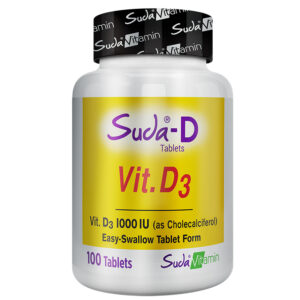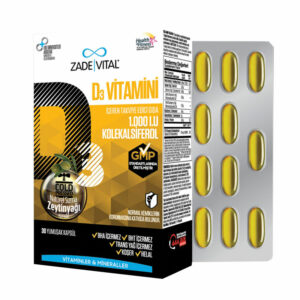What is Vitamin D3?

Vitamin D3 is a form of vitamin D that has a role in the continuation of body functions. It can be found in humans and animals. It is an essential vitamin for the proper functioning of the body’s nervous, bone, muscular and defense systems. It is soluble in fat. It can also be taken into the body through animal foods and dietary supplements. It can also be produced in the human body through ultraviolet radiation rays from the sun.
People who don’t get enough sun exposure may not be able to produce the vitamin D that the body needs. Therefore, vitamin D may need to be obtained through foods or dietary supplements. It is important to know which foods contain vitamin D3. In the continuation of our article, you can find answers to all your questions about vitamin D3
What Is Vitamin D3?
Vitamin D, like vitamin A and vitamin E, is fat-soluble and can be synthesized in the body. It also acts as a hormone . There are two different forms of vitamin D, vitamin D2 (ergocalciferol) and vitamin D3 (cholecalciferol). Vitamins D2 and D3 are very similar in their functions. They can contribute to an increase in the level of vitamin D in the blood. However, they may differ in terms of the food sources in which they are located. Vitamin D3 is more abundant in animal foods. It can be synthesized in the body through the contact of the sun’s rays with the skin. It can also be taken into the body through fatty animal foods.
What Does Vitamin D3 Do?
It can maintain the normal function of organs in the body such as the bones, muscular system, nervous system, heart and circulatory system. It can contribute to the strengthening of the immune system and make it more resistant to diseases. It’s benefits and tasks can include:
- It can regulate calcium and phosphorus levels in the blood.
- It can support the absorption of calcium from the intestines.
- It can contribute to the formation of bone structure and repair of bone damage.
- It can ensure the protection of tooth and gum health.
- It can support brain development and health.
- It can improve the body’s defense system and body resistance. Thus, it can prevent diseases such as diabetes and rheumatism, which can weaken the immune system
What Does Vitamin D3 Contain?
It can be ingested into the body through the sun’s rays, food, and dietary supplements. After ultraviolet rays from the sun come into contact with the skin, a series of chemical reactions occur. Thus, the production of vitamin D3 can take place. In addition, it is found in most animal foods with high fat content and can be taken into the body through the digestive system. The foods with the most vitamin D3 can be listed as follows:
- Fish (oily fish such as trout, salmon, sardines, tuna)
- Fish oil
- Kefir
- Fungus (growing under UV rays)
- Cheese
- Chicken meat
- Butter
- Milk
- Eggs
How to Use Vitamin D3?
Vitamin D is essential for maintaining the body’s normal functions. Ultraviolet-B (UVB) rays and nutrients from the sun can greatly meet the body’s need for vitamin D. However, vitamin D3 may occur in people who live in geographies where the sun’s rays are low, who have limited access to animal foods, and who have adopted a vegan or vegetarian diet (1). Individuals with vitamin D deficiency can use nutritional supplements containing vitamin D3 under the supervision of a doctor. When determining the dose of this vitamin supplement, the person’s age, gender, and the level of vitamin D deficiency should be taken into account (3).
The use of vitamin D3 can be provided in the form of tablets or drops on the recommendation of a doctor. Vitamin D3 supplements in tablet form can be taken into the body by swallowing with plenty of water. Those in drip form can be used by dripping into bread or another food recommended by the doctor. Vitamin D3 can raise the body’s energy. Therefore, insomnia can be seen when taken in the evening. It may be advisable to take the supplement in the morning to avoid sleep problems at night. If you have a disease and are taking medication regularly, you may experience a variety of side effects due to the risk that medication and supplemented food may interact. For this reason, you should not use vitamin supplements without consulting your doctor
When to Take Vitamin D3?
Vitamin D deficiency is very common in our country. Only 11% of adults have enough vitamin D3 in their blood. (7). People who think they are suffering from vitamin deficiency can consult a doctor. A detailed physical examination and blood test are performed. As a result of the evaluation, patients who are determined to have vitamin D deficiency in their blood values can start to use food supplements containing vitamin D3 with the recommendation of a physician. The dosage and amount of vitamin D3 may vary according to the person. How many days and how many times a day it will be used can be decided by the doctor according to the characteristics of the patient such as vitamin deficiency level, age, diseases, gender. It may be preferable to take it in the morning instead of in the evening during the day. Thus, the effect of vitamin D3 that increases body energy does not interfere with night sleep as it will manifest itself in the early hours
Daily Vitamin D3 Requirement
When vitamin D3 is not in sufficient levels in the blood, some health problems can occur. Therefore, people should take this vitamin daily. The daily need for D3 is determined differently by the World Health Organization (WHO) according to age groups. The recommended amounts of vitamin D3 in adults, children, and infants can be listed by age as:
- 0 IU for children from 12 to 400 months,
- 1 IU for people aged 70-600 years,
- 70 IU for people over 800 years of age.
The dosage of the drug may differ for everyone. Dose adjustment should be made according to the level of vitamin deficiency, the age of the patient, and the general health status. Therefore, you should use vitamin supplements in doses following the recommendations of your doctor.

Vitamin D3 Deficiency Symptoms
Vitamin D3 deficiency can lead to various problems in the body. Different diseases can occur in adults and children. It may be similar to vitamin D deficiency symptoms. In infants and children, rickets, a disease that leads to bone weakening, can occur. In adult individuals, osteomalacia may occur. In this disease, weakness in the muscles and weakness in the bones can be observed. In addition, osteoporosis (bone resorption) may occur in cases of long-term vitamin D3 deficiency. Symptoms of deficiency can include:
- Weakening of the immune system
- Increase in infections
- Hypocalcemia (Calcium deficiency)
- Hyperparathyroidism (Elevated parathyroid hormone levels)
- Muscle weakness
- Twitching in the muscles
- Bone pain
- Muscle pain
- Increase in bone fragility
- Osteoporosis
- Weakness and fatigue
- Diseases of the nervous system
- Diseases of the heart and circulatory system
Check Some of Our Vitamin D Products!
For More Products Visit Our Website and Join Our Family on Instagram!



